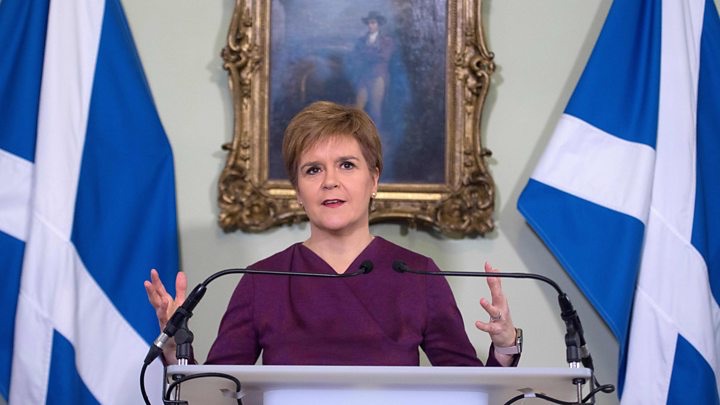
Scotland’s First Minister Nicola Sturgeon has officially begun the process of holding an independence referendum, calling on the London government to transfer the power to do so.
Ms Sturgeon said there was an “unarguable” mandate for a new vote after her Scottish National Party (SNP) won 48 of Scotland’s 59 seats in last week’s general election.
Despite winning a big majority across England and Wales, the Conservatives lost seven of their 13 seats in Scotland.
A document containing the SNP arguments and draft legislation to transfer powers has been sent to the Tory administration. The paper – called Scotland’s Right to Choose – put forward the democratic case for a Section 30 order from the London government, as the process is known.
Ms Sturgeon said: “There is a clear mandate for this nation to have the power to decide its own future. The result of last week’s General Election makes that mandate unarguable. So, with the publication of this document, we lay out the detailed case for putting Scotland’s future into Scotland’s hands.”
She added: “We will take forward work to update the detailed and substantive case for independence.
British Prime Minister Boris Johnson has repeatedly said he is opposed to holding an independence referendum. Johnson used the ‘Queen’s Speech’ legislative agenda at Westminster to say that the “integrity and prosperity of the United Kingdom” is of the “utmost importance”.
But Nicola Sturgeon warned Johnson that a refusal to would “not be the end of the matter”. The First Minister said she wants to hold the referendum in the second half of 2020 after an “overwhelmingly clear” election result.
She wants the section 30 order to put the legality of a referendum beyond doubt, as happened ahead of a referendum held in 2014. Independence supporters said then that another vote would only be held if there is a “material change” in the relationship between Scotland and England -- such as being taken out of the EU against its will.
In a statement at her official Bute House residence, Ms Sturgeon said: “There is no doubt whatsoever there has been a material change in circumstances since 2014.
“Today I urge people in Scotland to rally round the case for Scotland’s right to choose – our right to self-determination. It is not the time for Scotland to give up on reasoned and democratic argument but to pursue it ever more confidently.”
Independence campaigners believe that the more London blocks a democratic vote, the more it will build the case in Scotland not just for another vote, but for independence itself.
The Referendums (Scotland) Bill passed at the Holyrood Parliament in Edinburgh with the backing of the SNP and Scottish Greens, although Scotland’s three unionist parties - the Conservatives, Labour and the Liberal Democrats - voted against it, despite some leading figures in the Scottish Labour Party indicating their support.
Ms Sturgeon said: “Whatever people’s views on the issue of independence itself, there is a wide and growing consensus that Scotland must be able to choose its own future.
“Now that the election is over, and the result so overwhelmingly clear, I believe that consensus is growing by the day.
“And let me be clear, the demand for this country to have the right to determine its own path comes not just from me as First Minister – it flows from the people of Scotland and the verdict they delivered last week.”
She said she would push for a “legitimate” vote.
“The Scottish Government believes that right should be exercised free from the threat of legal challenge,” she said.
“We understand that a referendum must be accepted as legitimate, here in Scotland and the UK, as well as in the EU and the wider international community.”
![[Irish Republican News]](https://republican-news.org/graphics/title_gifs/rn.gif)
![[Irish Republican News]](https://republican-news.org/graphics/title_gifs/harp.gif)

